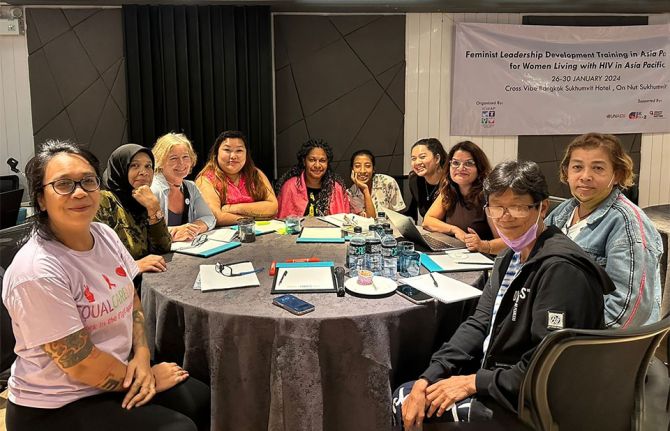



Feature Story
Asia Pacific women living with HIV build their power through Feminist School
08 March 2024
08 March 2024 08 March 2024One-third of people living with HIV in Asia and the Pacific are women. But their issues are often hidden.
Gender-based violence. Restricted economic opportunities. Child marriage. Underage pregnancy. Denial of property rights.
A UNAIDS-supported initiative by the International Community of Women Living with HIV Asia and Pacific (ICWAP) supports positive women’s organising. The Feminist School is a learning and consciousness raising programme that began in South Africa, and has been utilised in Asia-Pacific since 2016. The methodology, anchored in feminist principles, is specifically designed to enable women living with HIV to understand their personal experiences, locate them politically and develop strategies for community-driven advocacy.
“Marching in the month of March is not enough to realize women’s rights,” insists ICWAP Regional Director, Sita Shahi. “We need to speak up on the issue of gender inequality in the HIV response and the need for increased investments in women and girls. Women and girls living with HIV are going through serious human rights violations that, in turn, undermine their right to health.”
The Feminist School brings together women living with HIV, women from key populations, and young women from across the region. In the past two years, with support from UNAIDS, ICWAP has made adaptations to include modules on sexual and reproductive health and rights, movement building, leadership skills and the elimination of mother-to-child transmission (EMTCT).
“Feminist leadership training reveals the challenges faced by women living with HIV in the region. I have gained a lot of knowledge from the cross-country discussions and learned lessons about how women from different countries are breaking down human rights-related barriers, including stigma and discrimination,” said Salina from Malaysia.
Last year, a new module on the Global Fund processes was added.
“We recognized the importance of ensuring that interventions led by women living with HIV are included in Global Fund funding requests,” explained UNAIDS Asia Pacific Regional Adviser for Community-Led Responses, Michela Polesana.
UNAIDS supported a Global Fund Grant Cycle Seven (GC7) project focused on supporting the engagement of networks of women living with HIV in Cambodia, India, Thailand and Viet Nam in the current process. It found that organizations in these countries were at different stages of readiness and involvement. For example, India’s Positive Women Network (PWN+) was already participating in the process and benefitted from ICWAP’s technical support to strengthen their advocacy and organization.
Another UNAIDS-supported strategy ICWAP employed to bolster GC7 engagement was the facilitation of peer-to-peer growth by and for women living with HIV through the roll-out of an online Feminist School training. Through this initiative, country networks were supported in engaging in the Global Fund process and learned about its gender equality strategy, including the gender equality markers (GEM). They also received training to support them in their work to hold governments accountable.
The organization partnered with Ikatan Perempuan Positif Indonesia (IPPI), the Thai Positive Women’s Network, Viet Nam’s Women’s Network, the Association of Positive Women Advocates Inc (APWAI) from the Philippines, Women affected by HIV and AIDS (WABHA) from Papua New Guinea and an informal network of women living with HIV in Cambodia.
The groups identified priority issues for advocacy and recommendations for next steps and devised country-specific advocacy plans.
The advocates agreed on a set of three shared priorities. First, a seat for women living with HIV on each Country Coordinating Mechanism. Second, for positive women networks to reclaim antenatal care activities in prevention of mother-to-child transmission programmes. And finally, for capacity building for young positive women leaders.
Feminist school is helping women living with HIV to organize to secure their human rights. To protect women’s health it is vital to protect women’s rights. And to protect women’s rights it is vital to support women’s leadership.
“This is all about bridging the gap between outgoing leaders and an incoming, new generation,” Ms. Shahi said.
Region/country
- Asia and Pacific
- Australia
- Bangladesh
- Bhutan
- Brunei Darussalam
- Cambodia
- China
- Democratic People's Republic of Korea
- Federated States of Micronesia
- Fiji
- India
- Indonesia
- Islamic Republic of Iran
- Japan
- Kiribati
- Lao People's Democratic Republic
- Malaysia
- Maldives
- Marshall Islands
- Mongolia
- Myanmar
- Nauru
- Nepal
- New Zealand
- Pakistan
- Palau
- Papua New Guinea
- Philippines
- Republic of Korea
- Singapore
- Solomon Islands
- Sri Lanka
- Thailand
- Timor-Leste
- Tonga
- Tuvalu
- Vanuatu
- Viet Nam
- Samoa



